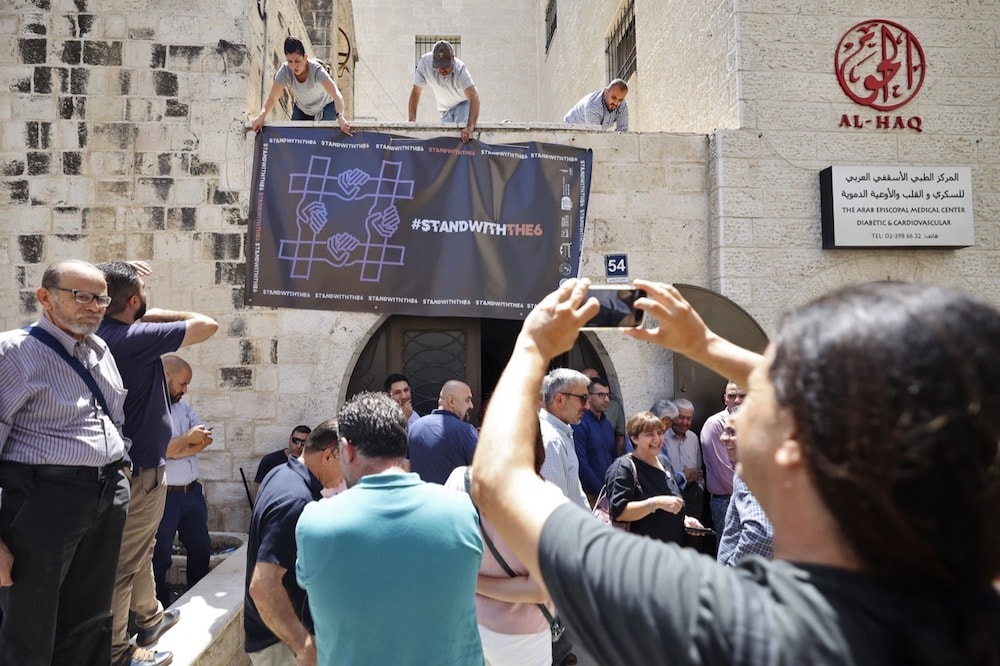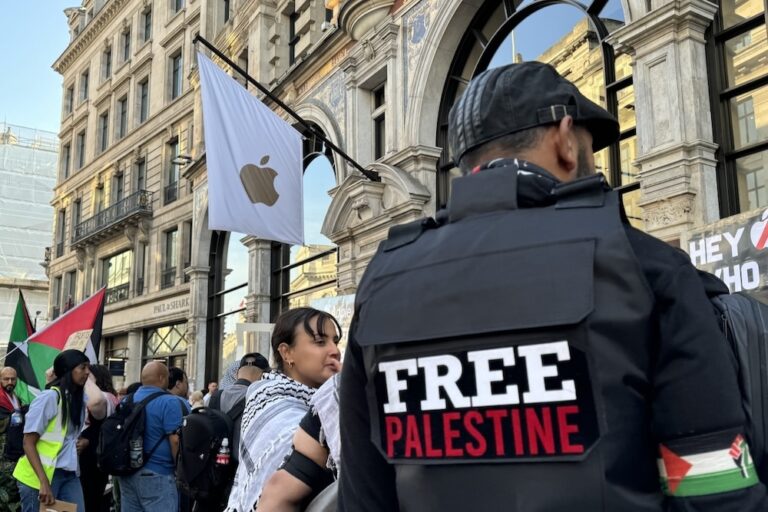August 2022 in Middle East and North Africa: A free expression roundup produced by IFEX's Regional Editor Naseem Tarawnah, based on IFEX member reports and news from the region.
Harsh sentencing of women social media activists in Saudi Arabia. Palestinian civil society organisations targeted. Sudanese journalists establish historic union to defend freedoms, and Morocco’s ‘playbook’ to crush dissent.
Cybercrimes and Cyberspies: Saudi Arabia ramps up repression
Marking a further escalation in the crackdown on free speech in Saudi Arabia, two Saudi women received record jail sentences for their social media activity in recent weeks. Doctoral student and online activist Salma Al-Shehab was handed a 34-year sentence by an appeals court for following and retweeting Saudi dissidents, while Nourah bint Saeed al-Qahtani reportedly received 45 years for posting critical tweets and “breaking the social fabric in the Kingdom”.
A University of Leeds medical student, Al-Shehab was detained after visiting Saudi Arabia in January 2021, interrogated for several months without access to a lawyer, and eventually sentenced by the country’s counter-terrorism court to six years in prison for tweets that “disrupt the order and fabric of society.” The Specialized Criminal Court of Appeal later increased the sentence to 34 years, followed by a travel ban of the same length, after concluding the original sentence failed to achieve “restraint and deterrence.”
IFEX joined rights groups in calling for Al-Shehab’s immediate release, as well as all other prisoners of conscience, noting that “in contrast to the authorities’ rhetoric on human rights, including women’s rights and legal reforms, the real drivers of reform – the activists calling for basic rights – continue to be ruthlessly targeted and silenced, with repressive laws being used to criminalize their peaceful expression and activism.”
Indeed, Al-Shehab and Al-Qahtani are among several Saudi women who have recently faced persecution for their online free expression under the country’s draconian Counter-Terrorism and Anti-Cyber Crime laws. This includes detained activist Dr. Lina Al-Sharif, who was arrested and forcibly disappeared for two months in May 2021 after security forces raided her home, and is being investigated on terrorism charges for her social media activism. While Al-Sharif has been held for over a year without actually being charged, these latest sentences are a worrying indicator of the harsh sentencing and lack of due process that she and other pre-trial detainees potentially face.
In a small step towards accountability, former Twitter employee Ahmad Abouammo, was found guilty by a US court last month for spying on behalf of Saudi Arabia. Charged in 2019 for failing to register as an agent of Saudi Arabia, Abouammo, and two other Saudi citizens working at Twitter were said to have provided Saudi authorities with the user data of more than 6,000 Twitter accounts, including at least 33 usernames for which Saudi law enforcement submitted emergency disclosure requests to Twitter.
On the list are murdered journalist Jamal Khashoggi, dissident Omar Abdulaziz, and imprisoned humanitarian worker Abdulrahman Al-Sadhan, who is currently serving 20 years in prison for penning an anonymous satirical twitter account. Abdulrahman’s sister, Areej Al-Sadhan, provided crucial testimony for the prosecution, helping illustrate the human cost of Abouammo’s espionage, despite being prohibited from providing details of her brother’s torture in court.
Raising concern over the various methods Saudi authorities use to target online activists for their free expression, the Gulf Centre for Human Rights (GCHR) called on Twitter and other social media companies to further enhance the protection of online activists and human rights defenders in MENA.
The trial also brought to attention Twitter’s responsibility when it comes to protecting user information, especially that of human rights activists, from governments practising transnational repression. In his role as a media partnership manager for the region, Abouammo was reportedly bribed with a total of $300,000 and a luxury watch in exchange for transferring user data, with a former colleague testifying that the social media company expected managers to cultivate relationships with key government officials, and that expensive gifts were customary.
“For Twitter to say that it did enough by cooperating after the fact is simply nonsense. They were obligated to cooperate. And moreover, it was in their PR interest to cooperate so that they could look like they were good citizens,” said Jim Walden, attorney for the Al-Sadhan family. “If they were good citizens, they would have a compliance structure where a user’s anonymous information is not generally available to Twitter employees, it is behind a protected firewall, and only high-level people with clearance for a specific purpose can access that information.”
Twitter’s negligence in protecting user information has already prompted two lawsuits from prominent human rights activist and Saudi dissident Ali Al-Ahmed, accusing the company of failing to do enough to protect his privacy.
Israel’s efforts to silence Palestinian civic space
In August, Israel’s raid and closure of the offices of seven prominent Palestinian civil society organizations that its Defence Ministry had designated as “terrorist organizations” received widespread condemnation from the human rights community. In a statement signed by over 190 local and international rights groups the actions are described as “the latest escalation in Israel’s widespread campaign aiming to silence and discredit any Palestinian individual or organization that dares to seek accountability for Israel’s grave human rights violations, war crimes, and crimes against humanity.”
The raids follow an October 2021 designation by Israeli Defence Minister Benny Gantz that labelled the rights groups “terrorist organizations”, under Israel’s 2016 Anti-Terrorism Law. Hours prior to the raids, Israel’s Defence Ministry announced its rejection of appeals launched by the targeted organizations earlier this year that sought to cancel the designations. UN experts called the designations “illegitimate and unjustifiable”, stressing that “no concrete and credible evidence substantiating Israel’s allegations has ever been provided,” and called on the international community to urgently use their leverage to stop the attacks on Palestinian civic space.
“This is not a job for us — it is our beliefs. We will continue our work defending justice and international law,” said Al-Haq director Shawan Jabarin during a press conference at the organization’s office where journalists, activists and heads of the groups gathered in solidarity hours after the raid.
Despite UN and EU rejections of Israel’s designations, the labelling continues to have a real-world impact, not only cutting off access to international funding, but also exposing the organisations to travel bans, prison sentences, and fund seizures, with directors of two of the targeted organisations already banned from travel.
Sudanese journalists establish union to defend freedoms
In a historic move, Sudanese journalists have formed the country’s first independent union in more than three decades, with Abdulmoniem Abu Idrees, Khartoum correspondent for Agence France-Presse, elected as the its first president. The new syndicate has renewed hope for an improved situation for journalists and media in the country, who have come under increased attacks since the 25 October 2021 military coup.
“The absence of the journalists’ syndicate [union] impacted negatively on journalism,” journalist Mohammed al-Agraa told The Guardian. “Journalists didn’t have any protection for their rights to access information or for freedom of speech. They lived in very tough situations, which led hundreds of them to leave the profession.”
The protection of Sudanese journalists is of paramount concern given that the country’s ongoing anti-coup protests continue to be met with lethal suppression by security forces. Protests in August claimed another protester’s life, bringing the death toll to 117 since weekly protests began after the October 2021 coup led by army chief Abdel Fatah Al-Burhan. Caught in the fray, dozens of journalists have faced attacks and arrests, with women journalists in particular facing physical threats and sexual violence.
The launch of a new police squad tasked with enforcing repealed public order laws – a move activists say is a return to “morality policing” – will do little to improve the climate women journalists, activists, and protesters face on the streets and in their homes.
In Brief
Palestine: IFEX member The Arab Center for the Advancement of Social Media (7amleh) was granted consultative status at the United Nations Economic and Social Affairs Council (ECOSOC). The organization said the new accreditation will allow it to bring the world’s attention to Palestinian digital rights, and the numerous human rights violations they are exposed to online, including surveillance, online censorship, and hate speech. “This is a decisive win for Palestinian civil society and demonstrates the UN’s commitment to ensuring that Palestinian voices are heard,” said 7amleh director, Nadim Nashif.
Morocco: In a new report, “They’ll Get You No Matter What: Morocco’s Playbook to Crush Dissent,” Human Rights Watch documents the range of tactics that authorities have employed to form an “ecosystem of repression” that aim to muzzle dissenting voices and scare off potential critics. From unfair trials and lengthy prison sentences, to smear campaigns, surveillance, physical intimidation, and the targeting of critics’ relatives – the report examines numerous cases exposing Morocco’s violations of its international human rights obligations, including the right to privacy, freedom of expression and association.



